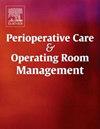Assessment of nurses' knowledge and practice in skin traction care for orthopedic trauma patients with fractures and associated factors in a developing country
IF 1
Q2 Nursing
Perioperative Care and Operating Room Management
Pub Date : 2025-04-24
DOI:10.1016/j.pcorm.2025.100494
引用次数: 0
Abstract
Objective
Nurses play a crucial role in maintaining and improving patient health. Their knowledge and practice in managing complex interventions such as skin traction, especially in trauma and elderly patients, are essential to prevent complications and accelerate patient recovery. This study aimed to determine the knowledge and practice of nurses in skin traction care for orthopedic trauma patients with fractures and associated factors.
Methods
This descriptive-correlational study was conducted using a convenience sampling method among 220 nurses working in the emergency and surgical departments of hospitals affiliated with XX University of Medical Sciences in 2023. A three-part valid and reliable tool was used to collect data on demographic characteristics, knowledge, and practice of nurses in caring for patients with skin traction. The collected data were analyzed using SPSS version 23 and descriptive and inferential statistical tests.
Results
Data analysis showed that most of the participating nurses were female, married, and held a bachelor's degree. Most nurses (65.5 %) had a moderate or higher level of knowledge about skin traction care. Regarding nurses' practice in skin traction care, the results showed that the majority of nurses (86.4 %) had a satisfactory practice level. There was a significant correlation between nurses' knowledge and practice in skin traction care (r = 0.244, p = .011). Moreover, nurses' knowledge was significantly correlated with their educational level (P = .014), and nurses' practice in skin traction care were significantly correlated with their work experience (P = .017) and gender (P = .040).
Conclusion
The results of the study showed that although the level of knowledge and practice of most nurses in caring for patients with skin traction was moderate or above, there is a need to strengthen specialized training in some dimensions of knowledge and practice, especially regarding awareness of the complications of using skin traction.
发展中国家骨科创伤患者骨折及相关因素皮肤牵引护理护士的知识和实践评估
目的护士在维护和改善患者健康方面发挥着至关重要的作用。他们在管理皮肤牵引等复杂干预措施方面的知识和实践,特别是在创伤和老年患者中,对于预防并发症和加速患者康复至关重要。本研究旨在了解护士对骨科创伤骨折患者皮肤牵引护理的知识和实践情况及相关因素。方法采用方便抽样的方法,对XX医科大学附属医院急诊、外科护士220名进行描述性相关研究。采用三部分有效可靠的工具收集人口统计学特征、知识和护士护理皮肤牵引患者的实践数据。收集的数据使用SPSS 23版进行分析,并进行描述性和推断性统计检验。结果数据分析显示,参与调查的护士以女性居多,已婚,本科以上学历。大多数护士(65.5%)对皮肤牵引护理有中等及以上的了解。在护理人员的皮肤牵引护理实践中,绝大多数护士(86.4%)的实践水平较好。护士对皮肤牵引护理的知识与实践有显著相关(r = 0.244, p = 0.011)。护士的知识水平与学历水平显著相关(P = 0.014),护士的皮肤牵引护理实践与工作经验(P = 0.017)和性别显著相关(P = 0.040)。结论本研究结果显示,大多数护士护理皮肤牵引患者的知识和实践水平为中等以上,但在某些方面的知识和实践方面仍需加强专业培训,特别是对皮肤牵引并发症的认识。
本文章由计算机程序翻译,如有差异,请以英文原文为准。
求助全文
约1分钟内获得全文
求助全文
来源期刊

Perioperative Care and Operating Room Management
Nursing-Medical and Surgical Nursing
CiteScore
1.30
自引率
0.00%
发文量
52
审稿时长
56 days
期刊介绍:
The objective of this new online journal is to serve as a multidisciplinary, peer-reviewed source of information related to the administrative, economic, operational, safety, and quality aspects of the ambulatory and in-patient operating room and interventional procedural processes. The journal will provide high-quality information and research findings on operational and system-based approaches to ensure safe, coordinated, and high-value periprocedural care. With the current focus on value in health care it is essential that there is a venue for researchers to publish articles on quality improvement process initiatives, process flow modeling, information management, efficient design, cost improvement, use of novel technologies, and management.
 求助内容:
求助内容: 应助结果提醒方式:
应助结果提醒方式:


